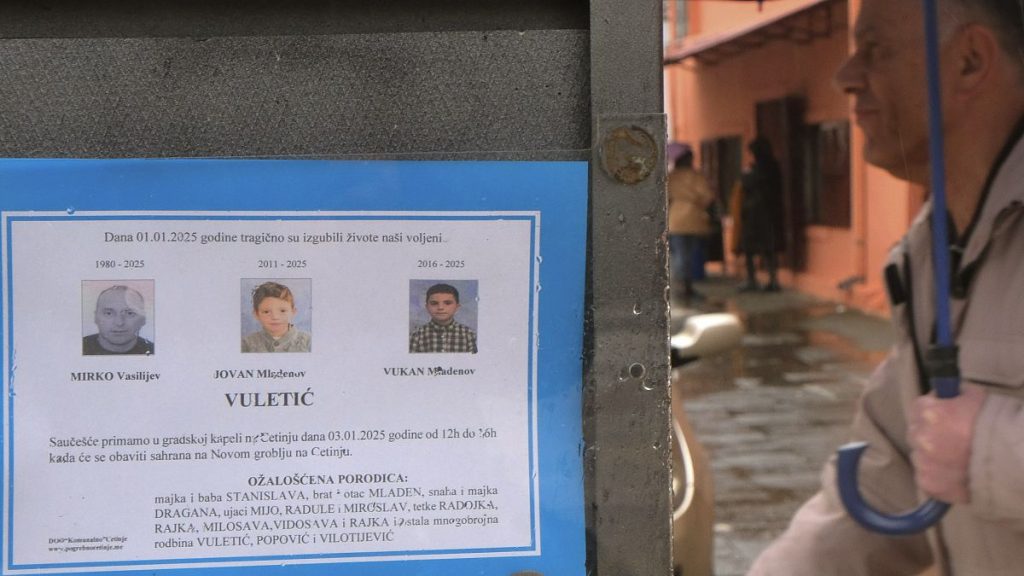The Scourge of Illegal Firearms and the Shadows of Tragedy in Montenegro
Montenegro, a small Balkan nation nestled on the Adriatic coast, has been jolted by two horrific mass shootings in less than three years, exposing a deeply ingrained gun culture and raising urgent questions about the prevalence of illegal firearms. The most recent tragedy, unfolding in the historic town of Cetinje, saw a gunman, identified as Aco Martinović, unleash a bloody rampage, claiming the lives of twelve individuals, including his sister and two children. This incident, chillingly reminiscent of a 2022 massacre in the same town, has ignited a wave of grief and anger, compelling the nation to confront the disturbing reality of its widespread gun problem. State broadcaster RTCG has reported that Montenegro holds the grim distinction of ranking sixth globally in the number of illegal weapons per capita, a statistic that underscores the gravity of the situation and the urgent need for comprehensive action. The ease of access to illegal firearms, coupled with a culture that often romanticizes gun ownership, has created a volatile environment where such tragedies can erupt with devastating consequences.
The Cetinje massacre has spurred the Montenegrin government to convene an emergency session of the National Security Council, signaling a renewed commitment to tackling the proliferation of illegal weapons. The council is expected to propose new gun control legislation and implement aggressive measures to confiscate illicit firearms from the population. This response comes amid mounting pressure from citizens demanding greater accountability from authorities and concrete steps to prevent future tragedies. The sheer number of illegal weapons circulating within the country presents a formidable challenge, requiring a sustained and multi-pronged approach. Enhancing border security to stem the flow of illegal arms into the country, coupled with robust enforcement of existing gun laws and stricter licensing procedures, will be crucial in addressing the root causes of the problem. Moreover, fostering a culture of responsible gun ownership through public awareness campaigns and educational initiatives can contribute to a long-term shift in attitudes towards firearms.
The 2023 Cetinje shooting stands as a stark reminder of the devastating human cost of unchecked gun violence. The gunman, Martinović, reportedly used an illegal 9mm handgun to carry out his attack, leaving behind a trail of devastation. Police recovered 37 shell casings at the various crime scenes and discovered more than 80 additional rounds of ammunition in his possession. Martinović’s motive remains under investigation, but preliminary reports suggest he may have snapped following a bar altercation, returning home to retrieve his weapon before embarking on his deadly spree. The victims, spanning different ages and genders, underscore the indiscriminate nature of gun violence and its capacity to tear apart families and communities. The incident has left lasting scars on Cetinje, a town still reeling from the 2022 massacre, and has shaken the nation’s sense of security.
The repeated occurrence of mass shootings in Cetinje within such a short timeframe raises troubling questions about the effectiveness of the state’s security apparatus and its ability to prevent such tragedies. While the police maintain that Martinović’s actions were unpredictable and impossible to foresee, his history of violent behavior and illegal weapons possession, coupled with his prior psychiatric treatment, raises concerns about potential oversight and failures in the system. The fact that Martinović was able to acquire and retain an illegal firearm despite his documented history underscores the loopholes that exist in current gun control measures. Critics argue that more stringent background checks, stricter enforcement of existing laws, and proactive monitoring of individuals with known histories of violence are essential to prevent future tragedies. The calls for greater accountability and the resignations of top security officials reflect the public’s frustration with the perceived inadequacy of the state’s response.
The aftermath of the Cetinje shooting has been marked by widespread grief, anger, and a collective demand for change. Hundreds of mourners gathered throughout Montenegro to hold candlelight vigils in memory of the victims, while protests erupted in the capital city of Podgorica, with citizens demanding answers and accountability from the government. The repeated occurrence of such violence has shaken the foundation of Montenegrin society, exposing deep-seated anxieties and prompting a critical examination of the nation’s values and priorities. The outpouring of grief and anger is not only a response to the immediate tragedy but also reflects a broader sense of frustration with the political divisions and systemic failures that have contributed to the current climate of violence. The public’s demand for change extends beyond stricter gun control measures, encompassing calls for greater transparency, accountability within state institutions, and a renewed focus on addressing the underlying social and economic factors that contribute to violence.
The task before Montenegro is daunting but crucial. The nation must grapple with its deeply ingrained gun culture, address the pervasive issue of illegal firearms, and strengthen its security apparatus to prevent future tragedies. This requires a multifaceted approach that includes legislative reforms, robust law enforcement, enhanced border security, and a concerted effort to change societal attitudes towards gun ownership. Furthermore, fostering greater trust between the public and state institutions is essential for building a safer and more secure future. The path towards healing and preventing further violence will require sustained commitment, open dialogue, and a willingness to confront the complex realities that have contributed to these devastating events. The memory of the victims demands nothing less than a comprehensive and unwavering commitment to change.


